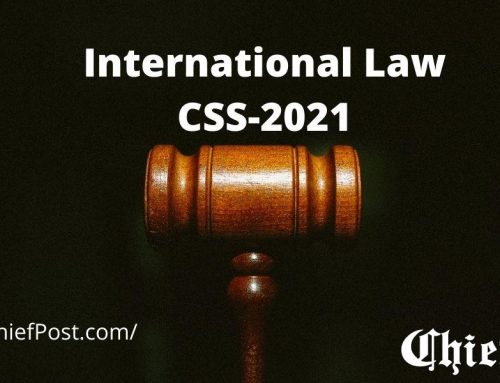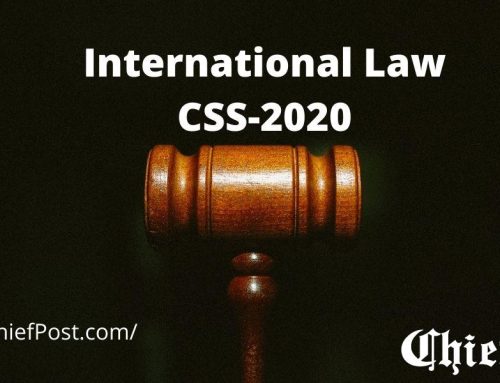International Law 2024 — CSS Past Paper
FEDERAL PUBLIC SERVICE COMMISSION
COMPETITIVE EXAMINATION-2024
FOR RECRUITMENT TO POSTS IN BS-17
UNDER THE FEDERAL GOVERNMENT
International Law
TIME ALLOWED: THREE HOURS
PART-I(MCQS): MAXIMUM 30 MINUTES
PART-I (MCQS) MAXIMUM MARKS = 20
PART-II MAXIMUM MARKS = 80
NOTE:
- (i) Part-II is to be attempted on the separate Answer Book.
- (ii) Attempt ONLY FOUR questions from PART-II. ALL questions carry EQUAL marks.
- (iii) All the parts (if any) of each Question must be attempted at one place instead of at different places.
- (iv) Candidate must write Q. No. in the Answer Book in accordance with Q. No. in the Q.Paper.
- (v) No Page/Space be left blank between the answers. All the blank pages of Answer Book must be crossed.
- (vi) Extra attempt of any question or any part of the attempted question will not be considered.
PART-II
Q. No. 2. (20)
(a) Can you draw a distinction between right of self-defense under Article 51 of the UN Charter and right of selfUT defense under customary international law? Discuss in the light of Caroline incident of 1837.
(b) Do you agree with the statement that right to self-defense constitute an exception to prohibition on the use of force under article 2(4) of UN Charter?
Q. No. 3. (20)
(a) What is prescriptive jurisdiction under international law? Examine its various kinds as set out in customary international law.
(b) Can a state exercise enforcement jurisdiction in the territory of another state? Discuss by reference to Lotus case (France V. Turkey) 1927.
Q. No. 4.
States are considered as original and principal subject of international law. (20)
(a) Provide and discuss two examples illustrating the fact that states possess the most full-blown form of legal personality under international law.
(b) Discuss advantages and disadvantages of the fact that states are still the primary subjects of international law.
Q. No. 5.
(a) Is International law a law or positive morality? Give reasons to support your answer.
(b) In what respects, International law differs from domestic law? Are there any similarities between the two? (20)
Q. No. 6.
What is Advisory jurisdiction of International Court of Justice (ICJ)? In what respects it can be distinguished from consent based contentious jurisdiction? Discuss in view of Advisory opinion of the International Court of Justice on the Legal Consequences of the Construction of a Wall in the Occupied Palestinian Territory 2004. (20)
Q. No. 7. (20)
(a) Narrate the importance of treaty in international law.
(b) Explain various steps in conclusion of a treaty.
Q. No. 8.
Write short notes on any two of the following: (20)
(a) Principle of non-refoulment.
(b) Jurisdiction of a maritime state over coastal waters.
(c) Legitimacy of perfidy and ruses in IHL.
**********










